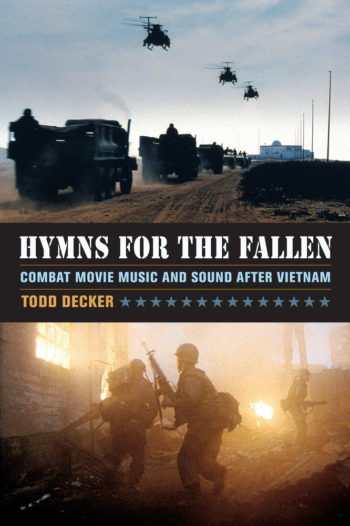
In ‘Hymns for the Fallen,’ Decker Examines Music and Sound in War Films

Todd Decker, chair of music in Arts & Sciences at Washington University in St. Louis, has published four books on commercial popular music in the United States. In his new book, Hymns for the Fallen: Combat Movie Music and Sound After Vietnam (University of California Press), he examines how the use of music, dialogue, and sound effects has evolved in war films over the past four decades.
Hymns for the Fallen developed from Decker’s Hollywood film music class, where he saw the same set of musical tropes being used in war movies from the 1980s, such as Platoon and Casualties of War.
“One thing led to another and then I have a list of 3, I have a list of 15, I have a list of 30 war films that used music in a particular way,” Decker said. “The book is completely from my teaching at WashU. It’s kind of unexpected for me because everything else I’ve done has been mostly pre-1970, mostly musicals. I haven’t dealt with a serious film genre like this before.”

Decker will discuss his book at a Library Faculty Book Talk at 4:30 p.m. Thursday, March 9, at Olin Library, Room 142. A reception will follow the talk, and books will be available for purchase. The event is sponsored by Washington University Libraries.
We spoke with Decker about the absence of the military marches in recent war films, the use of popular music, and why the helicopter is such a powerful symbol.
In Hymns for the Fallen, you categorize a set of movies as “Prestige Combat Films.” Can you define what those are? A Prestige Combat Film is a serious war movie that’s designed to engage an American audience with the experience of American soldiers. It’s not a war movie that’s supposed to impress you with explosions— although sometimes it does. It’s a movie that’s supposed to provide a cathartic, patriotic experience where you experience something of what American soldiers did in modern wars overseas. All of these films are about World War II, Vietnam, or wars in the greater Middle East. World War I and Korea have not been interesting wars for this genre. The prestige component is that these are action movies, but these are serious action movies. These are the only action movies up for Oscars. When people die, they die. There’s nothing cartoonish about the violence.
The movies in the book are all made after 1978. How did music in war films change at that time? Up to Vietnam, Hollywood war movies all used military marching band music, even films that are on the serious side where the plot and characters deal with some of the ambiguities of war. They end with this military music that says we’re all moving out of this theater together in step to victory because that’s what America does. But after Vietnam you can’t have that narrative anymore. A Vietnam film that ends with a military march on to victory is going to feel false to anyone who knows anything about Vietnam.
So when filmmakers in the late ’70s and ’80s started making movies about Vietnam, they had to invent a whole new way of using music in these films, and that’s what made these films so interesting to me as a film music historian.
The big argument of the book is that the music that gets invented in the ’80s to express a feeling of sorrow at losing the war in Vietnam ends up being the music for Saving Private Ryan in the ’90s. So when Hollywood turns to making new movies about World War II, they don’t go back to the march. Instead they use this new music of American war films that was created for Vietnam, and they apply it to World War II, and that same music gets used again in films about the Black Hawk Down incident in Somalia and the wars in Afghanistan and Iraq. The experience of the Vietnam War creates this rupture in Hollywood film music, and all war movie music is different after that. There are no more marches.
What does the music in these movies say about the American soldier? One of the interesting things is the use of popular music. There are a lot of examples of soldiers listening to music, playing music, sharing music. In a few films they even dance together. Vietnam is the first cassette tape war so there’s a lot of cassette tape music in Vietnam films.
Popular music in those films plays a big part in dealing with racial issues. I had a chance to talk to Oliver Stone at a conference and asked him about the music in Platoon, and he told me that the first time he ever heard black pop music, like Motown, was when he went to Vietnam. So for him the experience of a racially integrated military and living with and fighting with young black men is all connected with black pop music.
You note that the helicopter is the movie star of war vehicles. Why is it so impressive in movies? One of the traits of the Prestige Combat Film is that it tries to suggest that it gives a realistic picture of what it was like to be in the war. How filmmakers use the helicopter is often an indicator of whether they knew what it was like or not. You can’t have a conversation in the open bay of a helicopter while the rotor is going because it’s so loud, and yet in some of these films you have people talking over their shoulder in the helicopter.
Because most of the wars we’ve fought since Vietnam are asymmetrical wars where we’re the only ones with helicopters, the helicopter means America, it means the power of our military, it means help is on the way to an American soldier. Filmmakers use helicopters almost as music, and the sound of the helicopter becomes this indicator of American power.
Can you highlight three films that are the best examples of the Prestige Combat Film? Saving Private Ryan, Platoon, and The Hurt Locker are probably the three signal films. These films almost serve a sacred function; it’s like paying a ticket to go to a memorial service. What’s fascinating is years or even decades after a war is over there’s still this hunger among moviegoers to re-experience World War II and re-mourn or re-honor the men who fought. It is all very much centered on the veteran, to tell their story.
